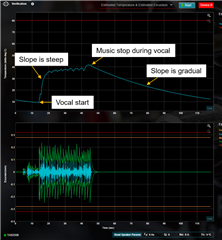Other Parts Discussed in Thread: TAS2559, TAS5825M
Hello team,
I have several questions regarding TAS2559EVM.
- I can't find registor map of TAS2559 although TAS5825M have an option of registor map. How can I see register of TAS2559?

- I take a hot wind to EVM board to check if measured speaker temp is raised. But the EVM stop working and output beep sound. Is this operation met your expectation? When I take a hot wind to speaker there is not beep but to IC on EVM board, beep is output.
- I found speaker temp is raised immedeately when vocal start but speaker temp is decreased just slowly when vocal stop. Why are they different behaivior?

Best regards,
Koyo

